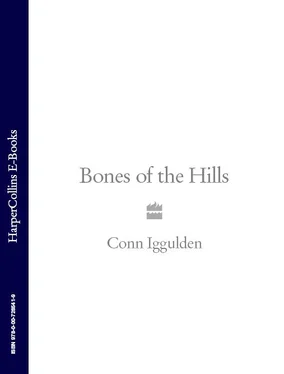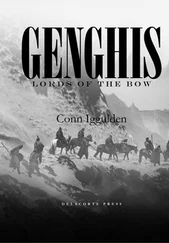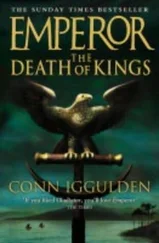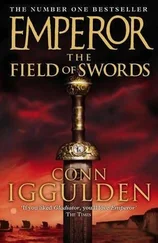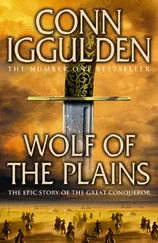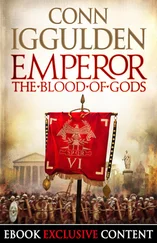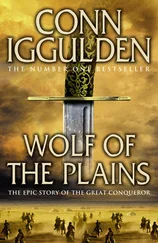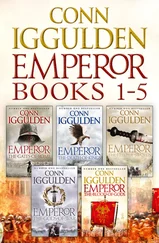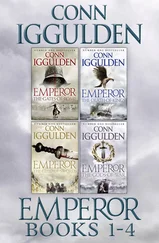Conn Iggulden - Bones Of the Hills
Здесь есть возможность читать онлайн «Conn Iggulden - Bones Of the Hills» — ознакомительный отрывок электронной книги совершенно бесплатно, а после прочтения отрывка купить полную версию. В некоторых случаях можно слушать аудио, скачать через торрент в формате fb2 и присутствует краткое содержание. Жанр: Исторические приключения, на английском языке. Описание произведения, (предисловие) а так же отзывы посетителей доступны на портале библиотеки ЛибКат.
- Название:Bones Of the Hills
- Автор:
- Жанр:
- Год:неизвестен
- ISBN:нет данных
- Рейтинг книги:4 / 5. Голосов: 1
-
Избранное:Добавить в избранное
- Отзывы:
-
Ваша оценка:
- 80
- 1
- 2
- 3
- 4
- 5
Bones Of the Hills: краткое содержание, описание и аннотация
Предлагаем к чтению аннотацию, описание, краткое содержание или предисловие (зависит от того, что написал сам автор книги «Bones Of the Hills»). Если вы не нашли необходимую информацию о книге — напишите в комментариях, мы постараемся отыскать её.
Bones Of the Hills — читать онлайн ознакомительный отрывок
Ниже представлен текст книги, разбитый по страницам. Система сохранения места последней прочитанной страницы, позволяет с удобством читать онлайн бесплатно книгу «Bones Of the Hills», без необходимости каждый раз заново искать на чём Вы остановились. Поставьте закладку, и сможете в любой момент перейти на страницу, на которой закончили чтение.
Интервал:
Закладка:
He blew a long dropping note, then repeated it. It was echoed on other horns across the field and his men heard. They pulled back, killing as the Arabs tried to rush them. Those who were still mounted broke free first, while those on foot had to defend every step as the Arabs surged after them. It was bloody work, but as the light began to fade, there was clear ground between the tumans and the army on the banks.
Genghis looked for his messenger scouts and could not see them anywhere close. He sent warriors for them and it seemed an age until they could be found. After that, he had them raise the banner that would summon his generals. He passed on orders to make camp just half a mile from the river and his men went with him. They had lost the cold face in the fighting, becoming flushed and vital. Some of them laughed wildly. Others rode in a dark mood, having seen their own death come too close that day.
They left a broken line of dead behind them, with many more of Jelaudin’s than theirs. The prince’s army had been torn apart, but they still jeered and shouted half-heartedly, the sounds coming from gasping, tired men. They saw the Mongols dismount barely eight hundred paces away. The tumans ignored the army behind them on the river bank, bringing up the pack animals for food and water as they prepared to make camp.
Jelaudin still lived, though his armour was gashed and bright in many places. He panted like a dog in the sun as he watched the Mongols ride away without looking back. The sunlight was becoming grey and, though he was relieved at the respite, he knew they would return at dawn. He and his men would have it all to do again.
‘I will die tomorrow,’ he whispered to himself.
None of his men heard him as they passed skins of river water along the line to ease their throats. He could feel their eyes on him as he stood staring onto the plain, perhaps hoping that he would yet come up with some stroke to save them all.
The rajah of Peshawar came through the ranks to join him at the front, taking moments as he did so to clap men on the shoulder and exchange a few words of encouragement. Those who had taken terrible wounds were beginning to cry out, the noise suddenly loud after the crash of battle. Many of them would die before morning. Jelaudin had supplies of opium for pain, enough at least to dull their wits while they died. It was all he could do for them and he felt ill with hatred for the khan of the Mongols.
He turned to his friend and both men knew they were finished, unable to bear the knowledge in each other’s eyes.
‘I think my father had the boats burned,’ Nawaz said softly. ‘He is a fool, lost in old ways and old Hindu gods. He does not understand why I chose to follow you.’
Jelaudin nodded, still staring out at the Mongol camp, seeming almost close enough to touch. The khan’s men surrounded them in a great bow. There would be no stealthy flight from the banks that night.
‘I am sorry I brought you to this place,’ Jelaudin replied. ‘I had such hopes, my friend! To see it come to this…’ He hawked and spat on the ground and Nawaz winced at the grief in his voice.
‘You could swim when you were a little boy, Jelaudin. Could you get across the river?’
‘And leave my men here? I won’t do it. You sank like a stone, Nawaz, if I remember. I had to drag you out myself.’
His friend smiled in memory. He sighed to himself, staring at the Mongols who rested in the growing gloom.
‘We showed they can be beaten, Jelaudin. You are still a talisman to the men. If you can cross the river, they will give their lives gladly. It does not have to end here. Take your brothers with you and live.’
He saw Jelaudin firm his mouth and spoke quickly to forestall the objection.
‘Please, Jelaudin. Let me command the men tomorrow. If I thought you would escape, I could fight without regrets. I promised the boats would be here. Do not let me die with this guilt, my friend. It is too much for me.’
Jelaudin smiled gently then, letting himself feel the weariness that ached in every joint.
‘Your father would be proud of you, if he knew it all,’ he said. ‘I am proud of you.’ He clasped Nawaz on the back of the neck before letting his hand fall.
As dawn came, Genghis roused himself, instantly irritable as his arm felt as stiff as a piece of wood. As he rose from the cold ground, he tested it gingerly. With his elbow at his side, he had good movement up and down, but if he held the limb away from his body, it felt loose and without strength. He swore to himself, hating the weakness far more than pain. The minghaan officer had come to him again before he slept, testing the joint and warning him that it needed a month of rest, then two more to rebuild the muscle he would lose.
Genghis clambered to his feet and accepted a bowl of salt tea from a warrior who had waited for him to wake. He sipped it slowly, feeling the warmth banish the chill from his limbs. He had spoken to his generals, commending Kachiun in front of them to repair the damage to his brother’s reputation. He had praised Ogedai as well and he was truly pleased with his son. Ogedai seemed to have grown in stature since becoming the heir. He had a quiet dignity to him that Chagatai had never had and Genghis wondered at the strangeness of fate. Perhaps he had been led to choose the right son to inherit his lands.
Jelaudin’s army was clearly visible as the light grew stronger. They had removed many of the dead and Genghis assumed the bodies had been dropped in the river to be tumbled away in the current. They did not look so fearsome now, Genghis thought. Almost half of them had been slaughtered the day before and, though it may have been his imagination, he thought he saw resignation in the way they stood so silently and waited. They did not expect to survive and that pleased him. He thought of the cities that had been so quick to rebel. They would hear of this day and consider what it meant for them. Herat and Balkh would be the first to see his armies and this time he would not accept tribute or surrender. He would make a lesson of them: that he would not be scorned or mocked.
Genghis tossed the bowl down onto the grass and signalled for a fresh horse to be brought. The tumans formed in squares and Genghis hardly cast an eye over them, knowing the officers would have worked through the night to bring new arrows and swords to those that needed them. He was no longer a young man, able to go two or three days without rest. While he slept, many of his warriors had worked, sharpening swords and tending to their horses.
As Genghis mounted, he saw Mongke and Kublai sitting with other boys nearby, sharing a piece of dried mutton. He scowled at the sight, looking around him for the nearest officer to take them to safety. Before he could find one, Jelaudin’s army shouted a challenge, sending flights of startled birds soaring up from the trees by the river.
Genghis stood in his stirrups, straining his eyes to see if they would attack. Instead, Jelaudin’s army parted and Genghis watched in astonishment as one man rode through them to the ground between the two armies.
The khan stared out at the lone rider. He did not know Jelaudin by sight, but it could be no other. As Genghis watched, Kublai and Mongke stood to see what was holding their grand-father’s interest. Both boys watched in fascination as Jelaudin took a knife and cut through the lacing holding his armour, so that it fell away in pieces.
Genghis raised his eyebrows, wondering if he watched some sort of ritual. In just moments, Jelaudin sat his horse in just a tattered robe and Genghis exchanged a glance with officers nearby, mystified. He saw the prince raise his sword as if in salute, then fling it at the ground so that it stuck point first in the earth. Was he surrendering? Three young men came from the ranks and he spoke to them, ignoring the Mongol host. The prince seemed relaxed in their presence and he laughed with them. Genghis watched curiously as all three men touched their foreheads to his stirrup, then returned to their places.
Читать дальшеИнтервал:
Закладка:
Похожие книги на «Bones Of the Hills»
Представляем Вашему вниманию похожие книги на «Bones Of the Hills» списком для выбора. Мы отобрали схожую по названию и смыслу литературу в надежде предоставить читателям больше вариантов отыскать новые, интересные, ещё непрочитанные произведения.
Обсуждение, отзывы о книге «Bones Of the Hills» и просто собственные мнения читателей. Оставьте ваши комментарии, напишите, что Вы думаете о произведении, его смысле или главных героях. Укажите что конкретно понравилось, а что нет, и почему Вы так считаете.
